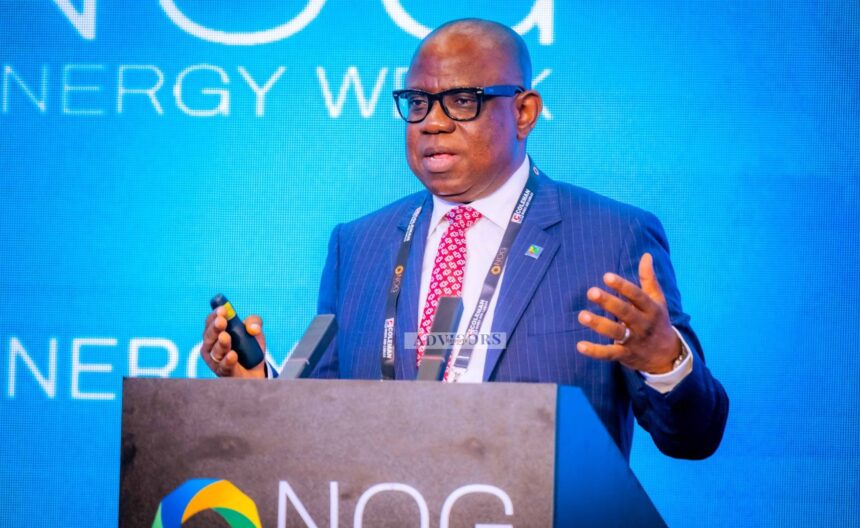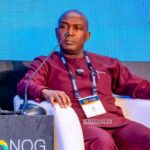… as Ojulari sets new KPIs: $60bn investment, 3mbpd crude output, 12bscf/d gas production by 2030
… to leverage NOG Energy Week as deal-closing platform
Oredola Adeola
The Nigerian National Petroleum Company Limited (NNPC Ltd.) has consistently met its cash-call obligations to joint venture operations and recorded 100% crude oil pipeline availability between May and June 2025.
Engr. Bayo Ojulari, Group Chief Executive Officer of NNPC Ltd., confirm this milestone during his keynote address at the 24th edition of the NOG Energy Week in Abuja.
He attributed the feat to the successful implementation of the Petroleum Industry Act (PIA), which provided an enabling environment for the industry-wide security interventions, contract reengineering, enhanced regulatory support, and stronger industry collaboration.
Ojulari said, “As of June 2025, we have achieved 100% crude oil pipeline availability across key national assets such as the Trans-Niger Pipeline (TNP), Trans Escravos Pipeline (TEP), Trans Ramos Pipeline (TRP), Trans Forcados Pipeline (TFP), and the Oando-Brass line.
“This was made possible by a collective effort involving the Federal Government, regulators, goal-oriented NNPC staff, and dedicated stakeholders, ensuring improved security surveillance and infrastructure integrity.
“However, despite the pipeline availability, Nigeria’s production remains below potential, with crude oil and condensate output 1.6million barrels per day (mbpd),” he said.
Ojulari called for the urgent need to ramp up production through new investments, citing years of underinvestment in the sector.
He noted that NNPC has transformed into a commercially focused limited liability company and has been repositioned to finance its operations independently and attract global investment partnerships.
“Today, NNPC can raise capital for all its ventures. That’s a major shift from being a state corporation to a business-oriented entity,” he noted.
Ojulari confirmed that NNPC has consistently met its cash call obligations for Joint Venture operations.
“Cash calls are critical contributions required from NNPC to fund joint venture operations. By clearing our obligations, we have demonstrated fiscal discipline, operational efficiency and restored confidence among our international partners,” he added.
Advisors Reports noted cash calls represent NNPC’s 55–60 percent share in capital and operational expenditures of JV projects.
Ojulari announced that his key performance indicator (KPI)
“Future editions of NOG Energy Week will now be used as a platform to close number of investment deals and measure performances.
“Our ambition is to increase investments in the oil and gas sector from $17 billion in 2024 to $30 billion by 2027 and $60 billion by 2030,” he said.
To support this vision, the NNPCL GCEO outlined a roadmap anchored on strategic partnerships with IOCs, technology providers, and the capital market, alongside performance-driven corporate reforms.
He added that President Bola Tinubu has mandated the NNPC to help raise sustainable crude oil production to 2 million barrels per day by 2027 and 3 million barrels per day by 2030, while targeting gas production of 10 billion standard cubic feet per day (bscf/d) by 2027 and 12bscf/d by 2030.
Ojulari reaffirmed NNPC’s commitment to the Decade of Gas initiative and Nigeria Gas Flare Commercialisation Programme (NGFCP), describing natural gas as “the magic bullet to industrialize Nigeria, power the economy, and improve lives.
“Our commitment is to ensure national development, address energy security, and create long-term economic value.
“We are not just participants in the energy transition, we are leading it, with a focus on natural gas and renewables.”
He further confirmed that the Ajaokuta-Kaduna-Kano (AKK) Gas Pipeline has successfully crossed the River Niger, boosting the hope of the project’s completion by Q4 2025.
Ojulari extended a call to both domestic and international partners to collaborate on building a resilient, inclusive, and sustainable energy future.
He called for innovation tailored to Nigeria’s specific context, underpinned by stable policies, robust infrastructure, and massive investment in technology and human capital.
According to him, Africa holds some of the richest reserves of oil, gas, and critical minerals, yet faces the highest levels of energy poverty. We must bridge this gap.
“Nigeria is your dependable commercial partner. From oil to renewables, from infrastructure to innovation, NNPC is laying the foundation for the future,” the NNPCL GCEO said.




